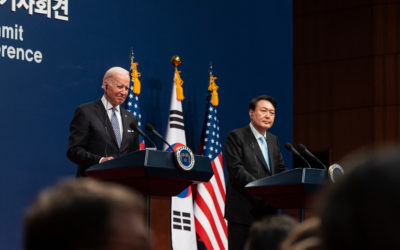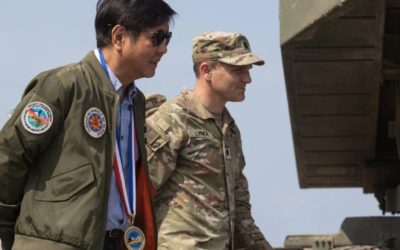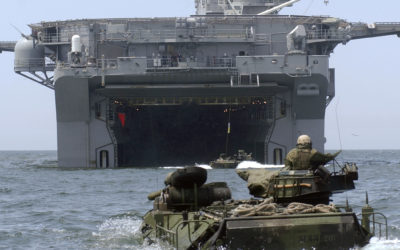On April 26, U.S. President Joe Biden welcomed South Korean President Yoon Suk-yeol to the White House for a summit meeting to celebrate the seventieth anniversary of the U.S.-South Korea alliance and open a new chapter for the next seventy years of expanded cooperation. Amid a substantial list of topics discussed by the two leaders, extended deterrence emerged as the top deliverable.
Taiwan Shows Resilience Amid Geopolitical Uncertainty
Taiwan Shows Resilience Amid Geopolitical Uncertainty
Taiwan Shows Resilience Amid Geopolitical Uncertainty
It is difficult to characterize Taiwan’s past year as good or bad. Taiwan now receives more international attention and support from the global community than ever before. In 2022, a record number of foreign government delegates visited Taiwan and there was outspoken support for Taiwan’s democracy. Taiwan appears to be finally getting the attention it has long deserved. But uncertainty in the Taiwan Strait is at an all-time high.
Those advocating for pro-Taiwan policies have achieved largely mixed results, despite their best efforts. Taiwan is now in a strong but increasingly complicated position.
In the first half of 2022, Taiwan’s politics focussed on pandemic management, including dealing with the Omicron variant of COVID-19 and slowly rolling back COVID-19 social restrictions. Taiwan removed policies like mandatory quarantine and limits on international arrivals. Taiwan is now open and eagerly welcoming back visitors.
Taiwan’s most consequential political developments occurred in the second half of 2022. In August last year, former US House of Representatives speaker Nancy Pelosi’s delegation arrived in Taiwan. Pelosi was originally scheduled to visit Taiwan in April, though her trip was postponed after she contracted COVID-19. Initially, it was not clear whether Pelosi would actually come to Taiwan. But when the Financial Times leaked plans of her trip weeks before her delegation’s visit to East Asia, it gave China ample time and the opportunity to make a mountain out of what could have been a molehill.
After Pelosi’s visit, China undertook a series of live-fire military drills in the waters around Taiwan that were qualitatively and quantitatively more intense than any military threat Taiwan has faced in decades. In response to China’s threats, much of the world has rallied to Taiwan’s side and expressed a newfound level of support.
There has been intense debate over whether Pelosi’s trip to Taiwan was good or bad, and whether it increased or decreased the likelihood of conflict. Whether symbolic victories like Pelosi’s trip are worth more than quieter, substantive victories is a question that has not been settled among analysts. Regardless, the trip marked a distinct shift for Taiwan internationally. China’s dramatic response in the form of heightened military drills changed the nature of China’s threats and thrust Taiwan into the global spotlight. Taiwan has become a central feature of global geopolitical discourse.
Pelosi’s visit and the debate that followed over the current direction of US Taiwan policy revealed a growing polarization among Taiwan analysts in Taipei and Washington DC. Some see Taiwan as safer and stronger because of Pelosi’s visit, pointing to an increase in pro-Taiwan actions from countries around the world. Others, instead, see the same factors as putting Taiwan in more danger of an invasion. Ultimately, though, whether particular policies increase or decrease the likelihood of conflict is often unclear.
In November and December 2022, Taiwan also held its ‘nine-in-one’ elections for local government officials. In what may have come as a shock for many observers around the world, Taiwan’s ruling Democratic Progressive Party (DPP) performed worse than expected. More mayor and county magistrate positions went to the Kuomintang (KMT) instead. Despite Taiwan’s President Tsai Ing-wen and the DPP’s strong standing with electors after Pelosi’s visit just months before the election, it was not enough for voters to express their support for the DPP when it came time to vote.
Yet the local election results are not necessarily correlated with Pelosi’s visit. Domestic context and local factors better explain the KMT’s victory and the DPP’s loss than China’s military threats. Despite the close timing, Pelosi’s trip was not discussed at all domestically during the elections.
There have been questions around the differences between the DPP and KMT’s performance and why Taiwanese voters behaved as they did. One explanation might be that leftover negative sentiment from COVID-19 policies harmed the DPP in the eyes of voters. Though the DPP also lacked a unified message and too many DPP-linked corruption scandals dominated the headlines. Ultimately, the answers are uncertain.
There are decades of public opinion data that show how China is typically the dominant issue during national elections. But there is a lack of long-term data to illustrate how Taiwanese voters cast their ballots during local elections. Without reliable data, there is a risk of presenting false narratives or misrepresenting Taiwanese civil society.
There is reason to be cautiously optimistic for Taiwan in 2023. It appears that more countries will continue to pay meaningful attention to Taiwan in the leadup to the country’s next presidential election in 2024. The hope is that the world will care about Taiwan on its own merits and not just view it through the prism of its relations with China. Taiwan is at a turning point geopolitically and the best other countries can do is push for change that helps rather than hurts Taiwan.
Licensed from the Commonwealth of Australia under a Creative Commons Attribution 3.0 Attribution License.
The Commonwealth of Australia does not necessarily endorse the content of this publication. Read the original article from the East Asia Forum.

Lev Nachman is Assistant Professor at National Chengchi University, Taipei.
Related Articles
President Marcos Jr. Meets With President Biden—But the U.S. Position in Southeast Asia is Increasingly Shaky
Over a four-day visit to Washington, Philippine President Ferdinand Marcos Jr. has been welcomed to the White House and generally feted across Washington. With President Biden, Marcos Jr. (whose father was forced out of office in part through U.S. pressure, and whose family has little love for the United States) affirmed that the two countries are facing new challenges, and Biden said that “I couldn’t think of a better partner to have than [Marcos Jr.].”
The U.S. is about to blow up a fake warship in the South China Sea—but naval rivalry with Beijing is very real and growing
As part of a joint military exercise with the Philippines, the U.S. Navy is slated to sink a mock warship on April 26, 2023, in the South China Sea.
The live-fire drill is not a response to increased tensions with China over Taiwan, both the U.S. and the Philippines have stressed. But, either way, Beijing isn’t happy – responding by holding its own staged military event involving actual warships and fighter jets deployed around Taiwan, a self-governed island that Beijing claims as its own.



